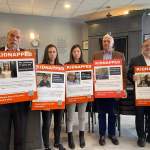
Internet users were spooked by a viral story about a couple’s Long Island home being searched by investigators curious why a man searched Google with the terms “pressure cooker bombs” and “backpacks.”
Michele Catalano, a journalist who was at work during the search, wrote about the experience as told by her husband on her blog this week after being led to believe that authorities tracked the searches through the search engine—not an unreasonable belief after the depth of the NSA’s Internet spying was exposed this summer.
After being swamped by press requests for more information about the case, Suffolk County police released a statement Thursday explaining that the tip came from her husband’s former employer, a Bay Shore-based computer company, not the Internet’s most-used website.
“After interviewing the company representatives, Suffolk County Police Detectives visited the subject’s home to ask about the suspicious Internet searches,” police said in the statement, noting that the searches were found on the man’s former workplace computer. “The incident was investigated by Suffolk County Police Department’s Criminal Intelligence Detectives and was determined to be non-criminal in nature.”
The statement came hours after such shocking headlines as: “Yes, The FBI is Tracking American Google Searches” on Gizmo.do, “Is the FBI snooping on our Google searches?” in The Christian Science Monitor and “Whatever you do, don’t search online…for anything” in Network World.
Catalano, who has since updated her blog to correct the record, unleashed the media feeding frenzy and resulting epidemic of panic attacks among computer users everywhere with her initial post, titled “pressure cookers, backpacks and quinoa, oh my!”
“They were peppering my husband with questions,” she wrote. “Where is he from? Where are his parents from? They asked about me, where was I, where do I work, where do my parents live. Do you have any bombs, they asked. Do you own a pressure cooker? My husband said no, but we have a rice cooker. Can you make a bomb with that? My husband said no, my wife uses it to make quinoa. What the hell is quinoa, they asked.”
The confusion in which agency was involved came when Catalano’s husband told her the investigators identified themselves as members of the joint terrorism task force, an FBI-led collaboration with local law enforcement. They left less than an hour later, satisfied that the searches were harmless curiosity about the bombs used in the Boston Marathon attacks and not the plotting of a locally based al-Qaeda sympathizer.
LI has had three, including Bryant Neal Vinas of Patchogue, who admitted aiding a terrorist plot to blow up the Long Island Rail Road, Samir Khan of Westbury, the editor of the al-Qaeda propaganda magazine Inspire, who was killed in a drone strike, and Justin Kaliebe, a Babylon and Bay Shore resident who pleaded guilty in June to trying to join al-Qaeda.
It was also the second time Suffolk authorities were compelled to address blog posts that turned into news stories in as many years. Last May, District Attorney Tom Spota released a statement discrediting false Internet rumors that the Long Island Serial Killer had been identified.
It also wouldn’t have been the first time a journalist on LI was eyed by investigators for Internet issues. Secret Service agents held this reporter for three hours for questioning while searching his computer at the 2008 Presidential debates at Hofstra University, citing “volatile” WiFi signals.



























